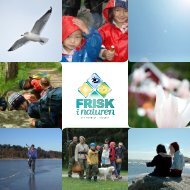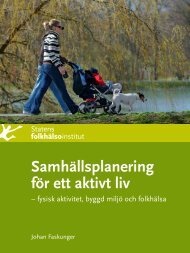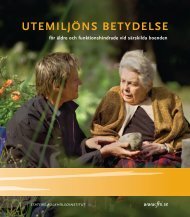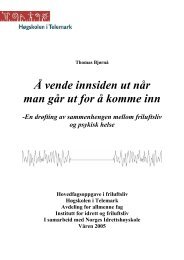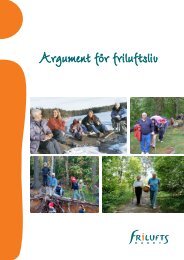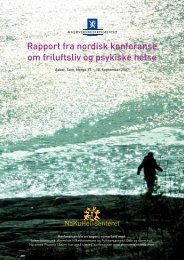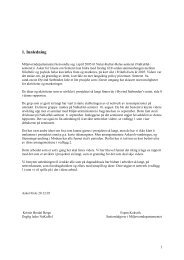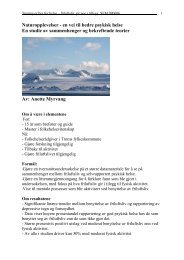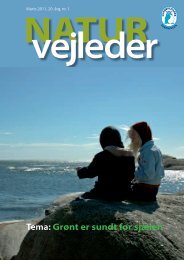Green Care: A Conceptual Framework - Frisk i naturen
Green Care: A Conceptual Framework - Frisk i naturen
Green Care: A Conceptual Framework - Frisk i naturen
Create successful ePaper yourself
Turn your PDF publications into a flip-book with our unique Google optimized e-Paper software.
Main described the crucial importance of a “culture of enquiry” in which<br />
everything that happens within the community – from behaviour, to<br />
management matters, to emotional experiences – is always open to scrutiny<br />
and question by any of the members in the community (Main, 1946). One<br />
of the more challenging aspects of a TC often pointed out by members<br />
undergoing treatment in one is that “there is no place to hide!” In Haigh’s<br />
developmental model for therapeutic community (Haigh, 1998), the first<br />
task when people join is for attachment, or ‘a sense of belonging’ to be<br />
engendered, and as they remain engaged the emotional culture needs to<br />
feel safe enough to do so – using psychoanalytic ideas of containment. A<br />
culture of enquiry requires also a culture of openness in order to function,<br />
so people can find their voice and be able to express material that is<br />
often difficult and painful: this is a principle about communication. Once<br />
members have found their voice they will be better engaged in the shared<br />
purpose of the community, will be able to find their place amongst others,<br />
and experience a sense of inclusion in it. Through the overtly democratic<br />
processes of a therapeutic community a strong sense of empowerment for<br />
the members is engendered. This is through a process of personal agency:<br />
members taking ownership of all the processes within the community and<br />
taking responsibility for themselves and each other.<br />
Theory<br />
There is an uncertain line between therapy and learning, and this means<br />
that therapy can sometimes be seen as an educational, or ‘personal<br />
development’ activity – while learning can sometimes, of itself, be<br />
therapeutic in the sense of ‘personal growth’. Therapy can be an<br />
opportunity to put learning into practice, and learning is crucial to therapy.<br />
Therapeutic factors are crucial to learning as one cannot learn any more<br />
than simple facts unless in a satisfactory relationship with one’s teacher.<br />
The therapeutic process, when seen through the medical lens of pathology,<br />
is one in which the best that can be achieved is “learning to be less<br />
troubled, or distressed, or sick”. But when seen through an educational lens,<br />
therapy is a process of growth, development and emancipation – and should<br />
be recognised as such.<br />
On a high tide of individuality, Western culture does not highly value<br />
communal and group living. For example, some local authorities prevent<br />
residential care homes for learning disabled residents having washing-up<br />
57



